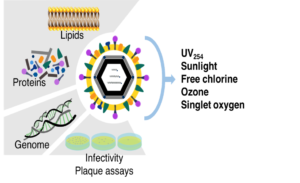Viruses, as major waterborne pathogen, pose significant risks to public health and contribute to medical expenses. Our research group works to seek a mechanistic description of virus fate in the environment and in engineering systems designed to mitigate their spread. Also, we are trying to improve virus detection and monitoring methods. Current ongoing projects in this research field include: (i) investigation of viral genome (DNA/RNA) reactivity during water disinfection processes, such as photolysis (UV, sunlight) and oxidation (chlorine, ozone, ROS); (ii) characterization of the fate of envelop viruses and viral components during disinfection processes, and examination of key products of viral components that react with disinfectants; (iii) development of qualitative and quantitative high resolution mass spectrometry detecting viruses in natural and engineering aquatic environments.
- NSF #1351188: Wastewater Treatment as a Conduit and Control of Emerging Respiratory Viruses in the Environment
- WRRF 14-17: White Paper on the Application of Molecular, Spectroscopic, and Other Novel Methods to Monitor Pathogens for Potable Reuse

